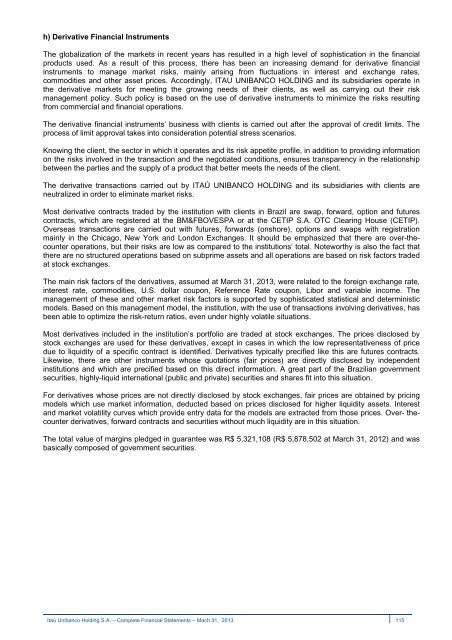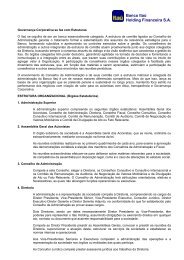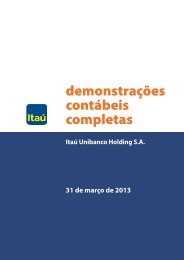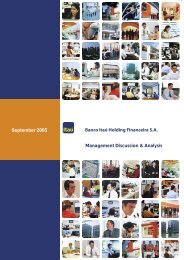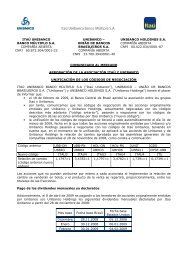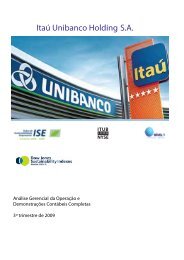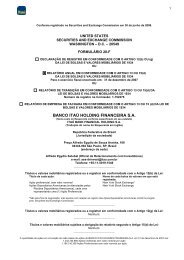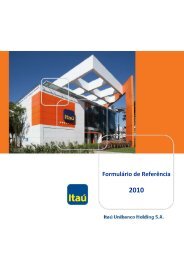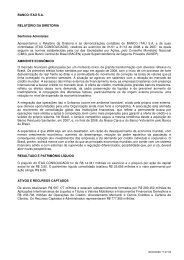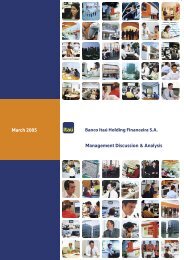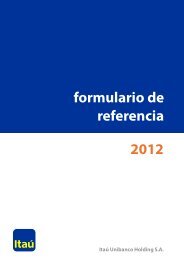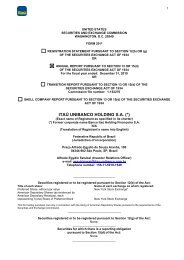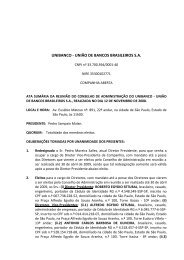IRR310313.pdf - Banco Itaú
IRR310313.pdf - Banco Itaú
IRR310313.pdf - Banco Itaú
You also want an ePaper? Increase the reach of your titles
YUMPU automatically turns print PDFs into web optimized ePapers that Google loves.
h) Derivative Financial Instruments<br />
The globalization of the markets in recent years has resulted in a high level of sophistication in the financial<br />
products used. As a result of this process, there has been an increasing demand for derivative financial<br />
instruments to manage market risks, mainly arising from fluctuations in interest and exchange rates,<br />
commodities and other asset prices. Accordingly, ITAU UNIBANCO HOLDING and its subsidiaries operate in<br />
the derivative markets for meeting the growing needs of their clients, as well as carrying out their risk<br />
management policy. Such policy is based on the use of derivative instruments to minimize the risks resulting<br />
from commercial and financial operations.<br />
The derivative financial instruments’ business with clients is carried out after the approval of credit limits. The<br />
process of limit approval takes into consideration potential stress scenarios.<br />
Knowing the client, the sector in which it operates and its risk appetite profile, in addition to providing information<br />
on the risks involved in the transaction and the negotiated conditions, ensures transparency in the relationship<br />
between the parties and the supply of a product that better meets the needs of the client.<br />
The derivative transactions carried out by ITAÚ UNIBANCO HOLDING and its subsidiaries with clients are<br />
neutralized in order to eliminate market risks.<br />
Most derivative contracts traded by the institution with clients in Brazil are swap, forward, option and futures<br />
contracts, which are registered at the BM&FBOVESPA or at the CETIP S.A. OTC Clearing House (CETIP).<br />
Overseas transactions are carried out with futures, forwards (onshore), options and swaps with registration<br />
mainly in the Chicago, New York and London Exchanges. It should be emphasized that there are over-thecounter<br />
operations, but their risks are low as compared to the institutions’ total. Noteworthy is also the fact that<br />
there are no structured operations based on subprime assets and all operations are based on risk factors traded<br />
at stock exchanges.<br />
The main risk factors of the derivatives, assumed at March 31, 2013, were related to the foreign exchange rate,<br />
interest rate, commodities, U.S. dollar coupon, Reference Rate coupon, Libor and variable income. The<br />
management of these and other market risk factors is supported by sophisticated statistical and deterministic<br />
models. Based on this management model, the institution, with the use of transactions involving derivatives, has<br />
been able to optimize the risk-return ratios, even under highly volatile situations.<br />
Most derivatives included in the institution’s portfolio are traded at stock exchanges. The prices disclosed by<br />
stock exchanges are used for these derivatives, except in cases in which the low representativeness of price<br />
due to liquidity of a specific contract is identified. Derivatives typically precified like this are futures contracts.<br />
Likewise, there are other instruments whose quotations (fair prices) are directly disclosed by independent<br />
institutions and which are precified based on this direct information. A great part of the Brazilian government<br />
securities, highly-liquid international (public and private) securities and shares fit into this situation.<br />
For derivatives whose prices are not directly disclosed by stock exchanges, fair prices are obtained by pricing<br />
models which use market information, deducted based on prices disclosed for higher liquidity assets. Interest<br />
and market volatility curves which provide entry data for the models are extracted from those prices. Over- thecounter<br />
derivatives, forward contracts and securities without much liquidity are in this situation.<br />
The total value of margins pledged in guarantee was R$ 5,321,108 (R$ 5,878,502 at March 31, 2012) and was<br />
basically composed of government securities.<br />
<strong>Itaú</strong> Unibanco Holding S.A. – Complete Financial Statements – Mach 31, 2013 115


